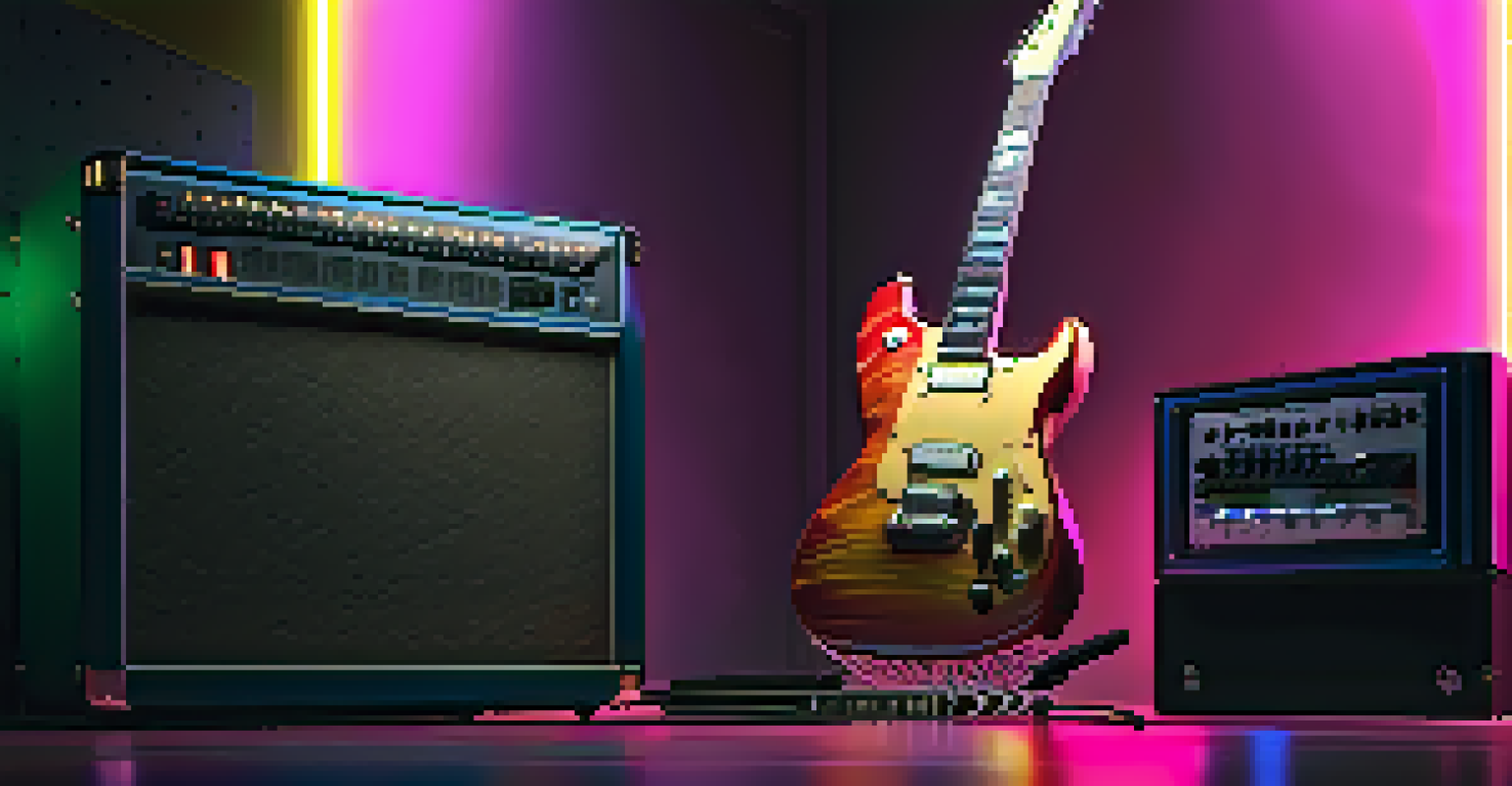Acoustic vs. Electric Music: How to Choose Your Instrument

Understanding Acoustic and Electric Instruments
At first glance, acoustic and electric instruments may seem similar, but they embody distinct characteristics. Acoustic instruments, such as guitars and pianos, produce sound naturally, relying on the resonance of their materials. On the other hand, electric instruments, like electric guitars and keyboards, require amplification to produce sound, giving them a unique tonal palette.
Music can change the world because it can change people.
The choice between acoustic and electric comes down to personal preference and the music style you wish to explore. Acoustic instruments often evoke a warm, organic sound ideal for genres like folk, classical, and blues. Conversely, electric instruments shine in rock, pop, and electronic music, offering a vast range of effects and sounds.
Ultimately, both instrument types have their charm and can be used to express your musical creativity. Understanding their core differences will help you make an informed choice that aligns with your musical aspirations.
The Sound: Exploring Tone and Volume Differences
One of the most significant differences between acoustic and electric instruments lies in their sound. Acoustic instruments produce a full, rich tone that resonates naturally, making them a great choice for intimate settings or solo performances. Electric instruments, however, can vary greatly in tone and volume depending on the amplification settings and effects used.

For instance, an acoustic guitar offers a mellow sound that is perfect for soft ballads, while an electric guitar can create anything from a crisp, clean note to a heavy, distorted riff. This versatility in electric instruments allows musicians to experiment with various styles and sounds, catering to a broader audience.
Acoustic vs. Electric: Sound Matters
The choice between acoustic and electric instruments hinges on the sound and tone that resonate with your musical style.
When choosing between the two, consider where and how you plan to perform. If you enjoy playing in small gatherings or cafes, an acoustic might suit you best. However, if you envision rocking out on stage with a full band, an electric instrument could be the right fit.
Playing Style: What Feels Right for You?
Your playing style can significantly influence your choice between acoustic and electric instruments. Acoustic instruments often require fingerpicking or strumming techniques that can be quite rewarding and expressive. Many beginners find that acoustic guitars facilitate easier learning of chords and melodies due to their straightforward nature.
The beautiful thing about learning is that no one can take it away from you.
Electric instruments, on the other hand, tend to offer a more extensive range of playing techniques, including bending notes, tapping, and utilizing effects pedals. If you’re drawn to complex solos or want to explore a variety of genres, an electric guitar or keyboard might be more appealing.
Ultimately, the best approach is to try both types of instruments. Spend some time playing each one to see which feels more comfortable in your hands and resonates with your personal musical style.
Budget Considerations: Acoustic vs. Electric Costs
When it comes to budgeting for an instrument, costs can vary significantly between acoustic and electric options. Generally, you might find that entry-level acoustic guitars are more affordable than their electric counterparts. However, it's essential to factor in the additional expenses for electric instruments, such as amplifiers and effects pedals.
Acoustic instruments typically have fewer add-ons, making them simpler and often cheaper to maintain. If you're just starting, an acoustic guitar, for instance, can provide a quality playing experience without the need for extra equipment.
Playing Style Influences Choice
Your preferred playing techniques can significantly affect whether an acoustic or electric instrument feels more comfortable and appealing.
That said, investing in a decent electric setup can open up a world of sound possibilities. If your heart is set on electric music, be prepared to budget for both the instrument and the necessary gear to create your preferred sound.
Genre Preferences: Matching Instruments to Styles
Different music genres often favor different types of instruments, and this can guide your decision. For example, acoustic instruments are staples in folk, country, and classical genres, where the natural sound is paramount. With their warm tones, they can evoke deep emotions, making them ideal for singer-songwriters and solo artists.
Electric instruments dominate genres like rock, pop, and jazz, where their versatility and ability to manipulate sound through effects are crucial. For instance, electric guitars can switch from smooth jazz tones to gritty rock sounds with the turn of a knob.
Consider the music you love and want to create. If you find yourself drawn to acoustic ballads, an acoustic guitar may be your best bet. But if you dream of performing in a rock band, an electric guitar could be the way to go.
Learning Curve: Acoustic vs. Electric Instrument Challenges
When starting your musical journey, the learning curve can vary between acoustic and electric instruments. Acoustic guitars are often praised for their straightforward nature, allowing beginners to grasp basic chords and strumming patterns quickly. This makes them an excellent choice for those just dipping their toes into music.
Electric instruments, while offering more versatility, can present a steeper learning curve. The addition of effects and amplification can complicate the initial learning process. However, many find the challenge rewarding, as it opens doors to various techniques and styles.
Budgeting for Your Instrument
Understanding the cost differences and additional equipment needed can help you make a more informed decision when choosing between acoustic and electric options.
Ultimately, the best instrument for you is one that matches your learning style and keeps you motivated. Whether you choose acoustic or electric, the key is to enjoy the journey of learning and creating music.
Portability: Where and How You Plan to Play
Portability can play a significant role in your choice between acoustic and electric instruments. Acoustic guitars, for example, are typically lighter and do not require extra equipment like amplifiers, making them easy to transport. This convenience makes them ideal for traveling musicians or those who enjoy jamming with friends.
Electric instruments can be bulkier due to the need for additional gear. An electric guitar may require an amplifier, pedals, and cables, which can be cumbersome during travel. However, portable options like small practice amps or battery-powered setups can mitigate this issue.

Consider where you plan to play most often. If you're looking for an instrument to take to parks or gatherings, an acoustic guitar could be your best bet. But if you envision a setup in your home studio or performing at larger venues, an electric guitar with the right gear may better suit your needs.
Making Your Decision: Key Takeaways for Choosing
Choosing between acoustic and electric instruments ultimately boils down to your personal preferences, musical goals, and lifestyle. Reflect on the sound you love, the genres you want to explore, and the practicalities of your playing environment. Each type of instrument has its unique advantages and appeals to different musicians.
If possible, visit a music store to test out various instruments. This hands-on experience can help you determine which feels most comfortable and aligns with your musical aspirations. Remember, the best instrument for you is one that inspires you to play and express yourself creatively.
Whether you choose an acoustic or electric instrument, what matters most is your passion for music and the joy of making it. Embrace the journey, and let your choice reflect who you are as a musician.